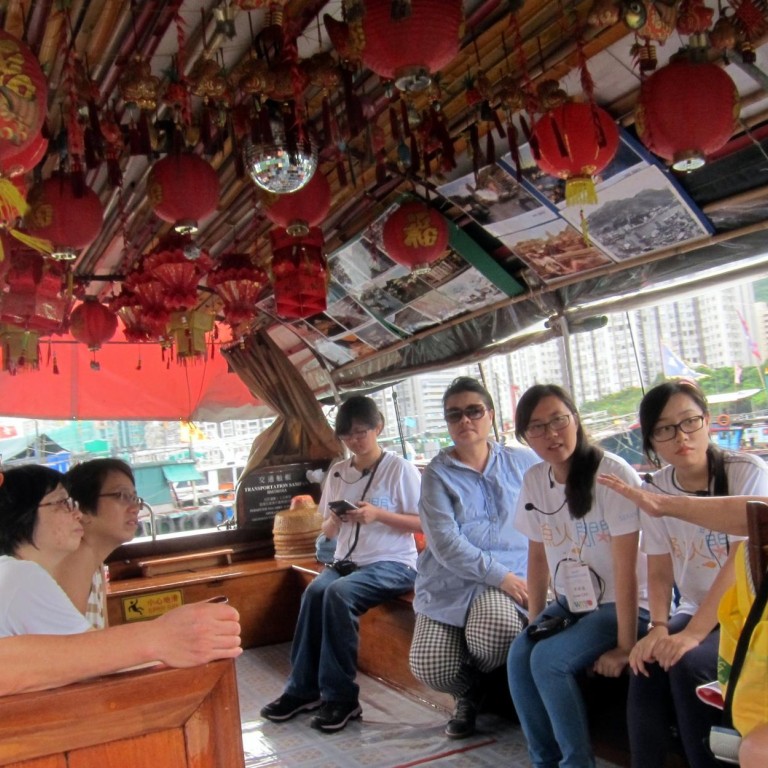
A tough crew: Hong Kong fishermen tell their life stories to young generation
HKU students are helping retired fisherfolk show visitors and fellow Hongkongers their vanishing way of life as part of a project to enhance Aberdeen and its harbour as a tourism destination
Fourth-generation fisherman Leung Pak-sun, retired and still robust at 70, never expected to be recruited to teach university students about Hong Kong's fishing history and culture.
Students have teamed up with fishermen to give public guided tours as part of the WAY (We Are With You) project launched by the University of Hong Kong in 2012 with HK$10 million funding from the Chow Tai Fook Charity Foundation.
Leading a group of visitors on a sampan excursion of the Aberdeen waters, Leung recalls how junks sailed the borderless sea between Hong Kong, China and Vietnam in the early days when life was simple and fish were plentiful.
"Hong Kong had such a vibrant fishing industry; we even exported fish to Japan, Europe and North America," Leung says. "The younger generation is not familiar with our fishing past, nor does anyone want to be a fisherman now."

As the sampan passes the flotilla of fishing vessels docked in the typhoon shelter, Leung points to the stern trawlers introduced to Hong Kong from the UK in the 1980s.
His assistant guide Irene Lee Mei-yee, an HKU law major, translates into English how the trawler catches fish.
"The two ends of the net are attached to the stern's otter boards. The vessel sails forward towing the net behind which flares apart, encircles and trawls the fish to shore," Lee says.
The WAY project puts students in touch with communities in Hong Kong, allowing each to learn from the other. Over the past two summers, students and teachers have designed community projects, such as renovating village houses and subdivided flats for the disadvantaged in Southern district.
HKU's Dr Wong Wai-ling, an expert in oral history, initiated the fishermen's project as part of her research on Hong Kong's fishing heritage. In one of her interviews with Aberdeen fishermen, Law Kam-Chuen reminisced about his childhood days in Miao Wan, a quiet island in China's Wanshan archipelago with a long fishing tradition. His family sailed weekly to Cheung Chau in Hong Kong to sell their boatload of sun-dried, salted fish and take home rice and groceries.
Miao Wan's tranquillity was disrupted in 1949 when China's new Communist regime required fishing families to collect and distribute all the fish they caught among themselves. That triggered an exodus of the island's most hard-working and enterprising fishermen, including Law and his family, to Hong Kong. The new arrivals quicky received Hong Kong identity cards and fishing licences.

Other fishermen recalled surviving fierce waves and escaping gunfire while fishing 650km to the west in the Gulf of Tonkin - the border between China and Vietnam.
"The impoverished Vietnamese military could not afford warships. They'd just shoot from their fishing boats," fisherman Chan Kwok-wah told Dr Wong.
The WAY fishermen's project attracted students of all faculties, who worked closely with Aberdeen's fishermen to piece together vanishing life stories and preserve them for future generations.
Art major and student guide So Man-hing learned that, in those days, fishermen and their wives would sail out late in the evening and spend the whole night catching fish. After returning the next morning, the couple would be exhausted, but while the husband rested, the wife had to take care of the family.
The impoverished Vietnamese military could not afford warships. They'd just shoot from their fishing boats
"It's difficult to stand on a rocking boat and I can't imagine how they cook while steadying themselves," Man-hing says. "They have a tough life. I admire their tenacity. It's an enriching experience that I can't obtain from textbooks."
By unearthing and tapping into Aberdeen's social capital - the fishing community's rich heritage - the project has been able to develop a sustainable social enterprise which creates jobs to integrate and empower some of society's less privileged.
"We'll eventually hand over the guided tours to the fishermen, who'll manage the enterprise themselves," Dr Wong says. "Our goal is to replicate successful pilot projects in other districts."
Chow Tai Fook sponsor Peter Cheng Kar-shing, who joined the sampan tour last year, was impressed by the fishermen's stories and their native charm. He believes that, in portraying Hong Kong's indigenous heritage to Chinese and foreign visitors, the enterprise has considerable educational and tourism value.
The project envisages building on the guided tours to foster the renewal of Aberdeen's fish markets by setting up seafood restaurants and craft shops. An exhibition centre would house a permanent display about Hong Kong's fishing industry and the changing lifestyles of its fishermen.
Meanwhile, an HKU exhibition - "Stories of Aberdeen Fishing Folk" - brings Hong Kong's early water-borne community vividly to life. It traces the rise and fall of the fishing industry through the lives of fisherfolk such as Law Wai-fong, who was baiting fish hooks at the age of three, long before she went to school.

In between overnight fishing trips, Law was only able to attend classes four days a week. Many other children could not afford to go to school.
Law spent most of her life on the family boat. She recalls eating fish every day, doing homework in the gas-lit cabin after dinner and sleeping with her seven siblings under one blanket below deck.
Now settled in an Ap Lei Chau flat with her own family, Law, 62, has finally hung up her nets after many decades.
Like Law, most fishermen have traded in their boats for homes onshore and retired. With Hong Kong's fishing fleet having shrunk from 10,000 at its peak to 4,000 today, the city's fish markets are largely supplied by Chinese vessels.

